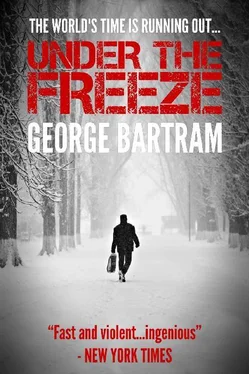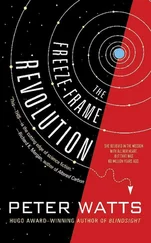Laforet had put the tips of his slender fingers together as he sat cross-legged in the hard chair. “The Argentinians began to show an interest in undersea research in the middle nineteen fifties — about the time Pope-Ginna emigrated to Argentina and Schneider first began to make a splash as an industrialist. France has always been a world leader in the field, of course; it was hardly an accident that they came to us for a submersible. Not a submarine, but a two-man deep-diver. It was purely a private undertaking on both sides — an Argentine consortium buying from Recherches Maritimes of Marseilles. I’ve had people looking into this for two weeks now. They bought a used submersible with a very limited range and a depth capacity of two hundred meters. It could not have been used by itself to reach the Homburg ; however, carried on a submarine that surfaced in the polynya , it could probably have explored the wreckage. Actually bringing materials out of the wreckage would have taken divers.”
“In that cold?” the former president said. “Poor guys!”
“The polynya is there because the water’s warmer than the ice. Something’s causing it to form every few years in the warm season. I don’t think cold would have been much more a problem than if they were working at that depth anywhere.”
“Still,” the former president said wonderingly, “that’s a remarkable damned operation!”
“It’s an involved operation. Especially in the fifties. But the goal made it worthwhile. It would have taken cooperation from the navy, or at least from the sub commander and his crew. A plane, probably, to check on the polynya before going in. Hired divers. But it was a lot of money. You can subvert a lot of people with that much money.”
Repin was scowling. “But what has this to do with the price of cabbages in Moscow? This is all history. I am interested in Soviet plutonium, not in Argentine gold.”
Tarp spoke very carefully. “Pope-Ginna was the adviser on a the purchase of a refitted Soviet submarine in the midseventies. That could have been when the contact with Maxudov was made. It may have been his idea, not Maxudov’s, to deliver the plutonium by submarine. I believe that the delivery was made underwater down toward the Antarctic drift ice.” He met Repin’s skeptical eyes. “And picked up by submarine, I suspect. And taken to a very safe storage.”
Laforet linked hrs fingers over one knee. “In 1978, the same Argentinian consortium took delivery of a French-made deep-sea habitat. They have been developed out of the technology used in ocean drilling platforms and are intended for research where divers spend rather long periods of time actually living at depth. We don’t know what the Argentinians did with the habitat.” He uncrossed his legs and smiled around the group. “Is anyone hungry? I think it is time for something to eat.”
* * *
Tarp watched them as they ate. There was the bread that Therese had made, crusty, golden on its outside; Danish butter; and two cheeses. Laforet had brought wines that would have suited a diplomatic dinner and that had the effect of suiting Repin as well. They had not come together as a group, and Tarp purposely held back from taking any of them aside. Laforet and “Mr. Smith” were already compatible and tended to gravitate together; Juana headed for Tarp; and Repin looked as if his suspicion of the American president and his resentment of his French captor would keep him isolated. It took a question from Laforet about the wine, however, to make him a third with the two older men. They remained suspicious of each other, but they used the wine as a medium through which to reach and test each other.
“Are you really going there?” Juana murmured to him. “Under the ice?”
“Yes. It’s actually safer than some other diving I’ve done.”
“It makes me sick in my stomach to think about it.”
“That’s because you’re thinking about the ice. Don’t think of the ice. Anyway, I’ll have the best equipment going.”
“How? From where?”
Tarp nodded toward the three older men, who, at Laforet’s insistence, were opening a different wine so they might compare it. “Them.”
She looked down at the floor. Her crest of black hair nodded in front of him like a plume. “What of me?” she said.
“You have a more dangerous job. If you’ll do it.”
“ More dangerous!” She almost laughed. “Where am I to go — the North Pole?”
“Buenos Aires.”
He took her hand and moved toward the others. With a far greater concentration than they had shown to the matter of the Homburg and its passengers, they were, all three, standing with half-full wineglasses just under their noses, inhaling. They might have been practicing some obscure religion, so intense and so odd were they. Tarp stopped and squeezed Juana’s hand, and they stood there and listened to the deeply serious, strange things that men say about wines. Shaking his head, Tarp led her to the kitchen, where they made coffee and she uncovered a tray of sweet pastries that Therese had somehow concocted.
“Repin will do very well with her,” Juana said. “She is a good, good woman for him.”
Tarp thought of the Lubyanka, of Moscow’s cold, of the girl he had seen on the corner as he was being driven out of the city. “Maybe,” he said. When they went back in, “Mr. Smith” was asking Repin if he ever played golf, and Repin was saying that he did not, but he admired American poker.
“Gentlemen,” Tarp said. Repin and the former president had been speaking English; Tarp stayed in that language. “Can we return to business now?”
“ Revenons à nos moutons ,” Laforet murmured.
“To the matter,” Repin said in Spanish. They all sat in the same chairs they had sat in before, as people invariably do; Tarp and Juana put the pastries and the coffee on the floor in the middle of the group. When a silence had fallen, Laforet, a small cup and saucer held in his hands like a votive lamp, said, “The French undersea vessel Vairon was in the Red Sea day before yesterday. It is a deep-diving submersible with a range of forty miles and a maximum safe depth of three hundred meters and will carry three people. Two nights ago, it was brought ashore and trucked to the military airfield at Tokar. Yesterday, an American C-one thirty aircraft picked it up and flew it to Cape Town, South Africa. Mr. Smith?”
The former president hurried to finish a tart, and, brushing his fingers free of crumbs, he said, “One of America’s more cooperative oil companies has a high-speed tanker called the Global Clipper that was supposed to start around the Cape for Lagos several days ago. For reasons I won’t go into, the chairman of the board persuaded the captain to turn around and head for Cape Town. Estimated time of arrival is after midnight, tonight.”
Laforet stirred his coffee and then cleared his throat. “Tonight, two superheavy Hirondelle XP-seventeen helicopters will fly from their base in Cameroon to Cape Town and one will go aboard the Global Clipper as soon as possible. The ship, with the research vessel and one helicopter, will sail at once for the Antarctic.” He looked at Tarp.
“I’m leaving for Cape Town at seven tonight.” He looked at Juana, who was pale but expressionless; Repin, on the other hand, seemed agitated. “The second chopper will fly me out to the Global Clipper and will stay aboard. We hope to be off the drift ice in four days. From there, I intend to have the choppers transport the Vairon to the polynya .”
Juana said coldly, “And I am to go to Buenos Aires? On whose authority, please?”
Читать дальше












